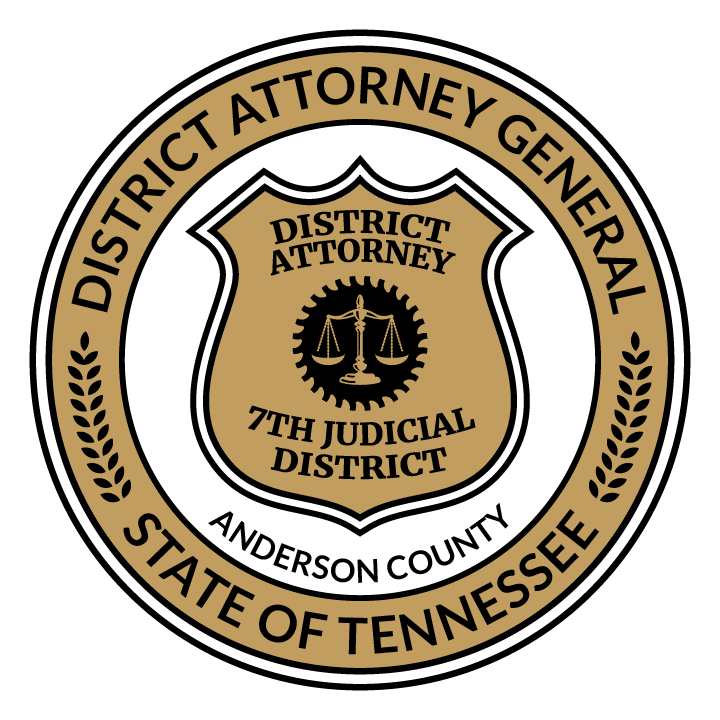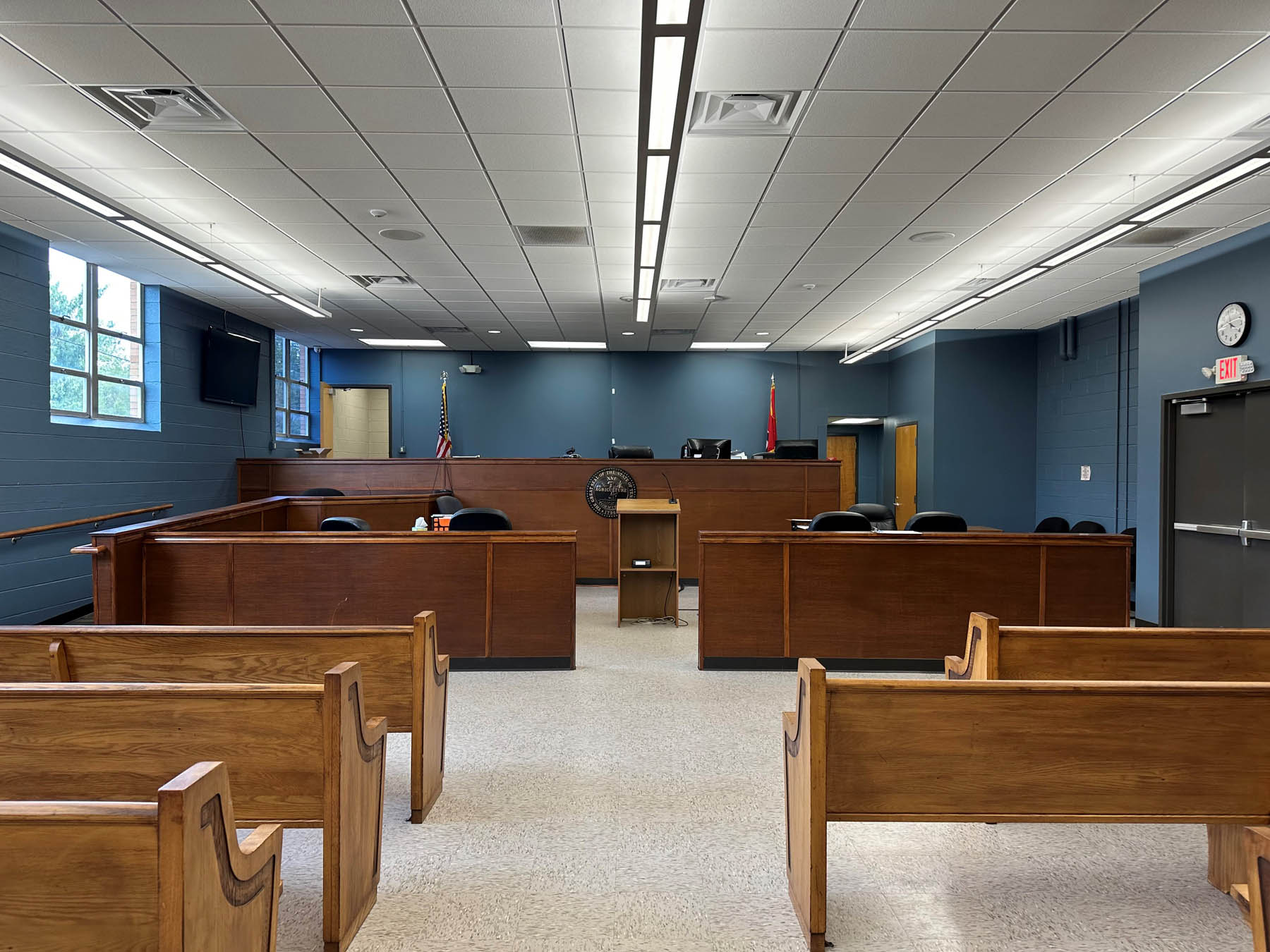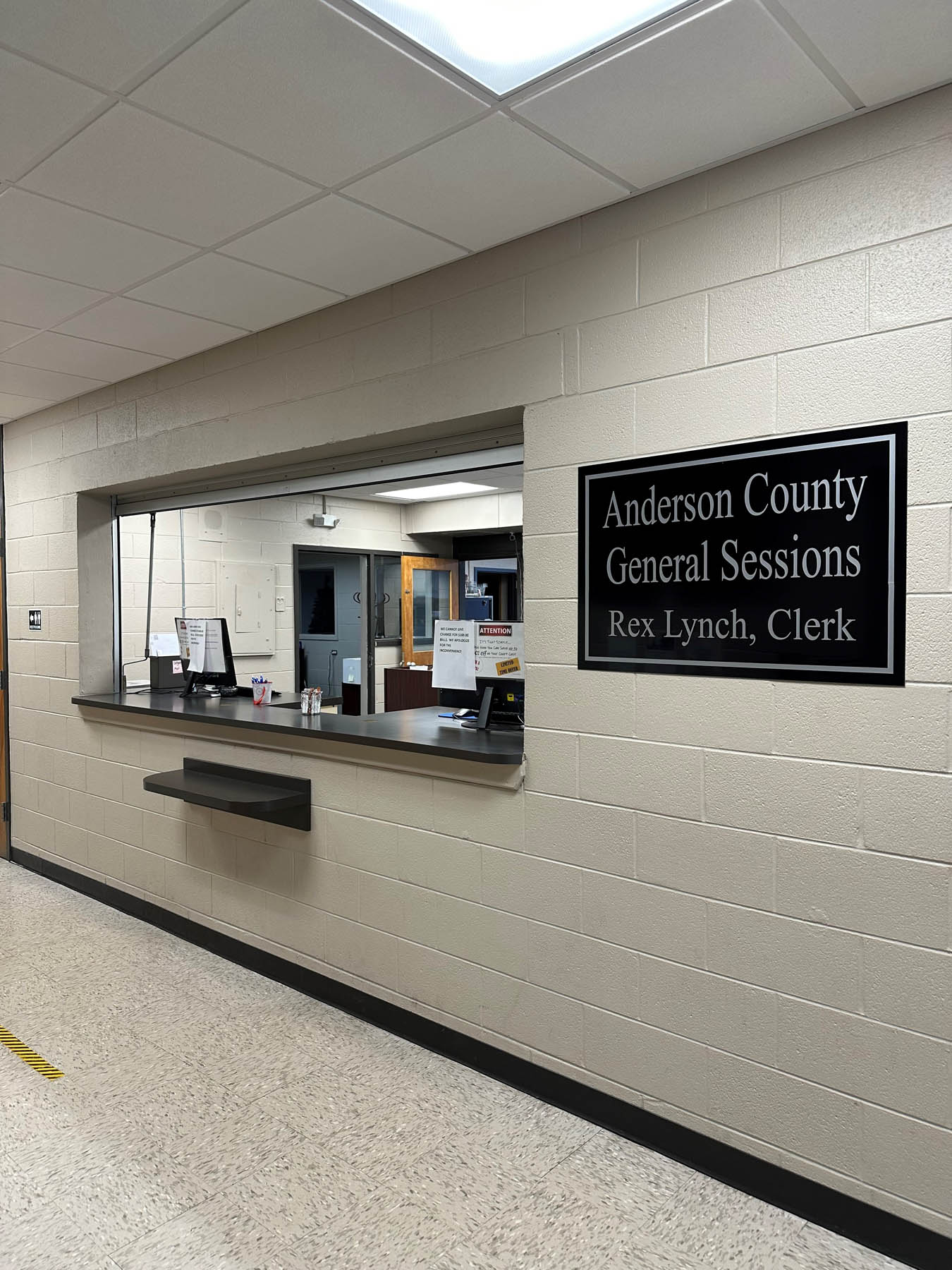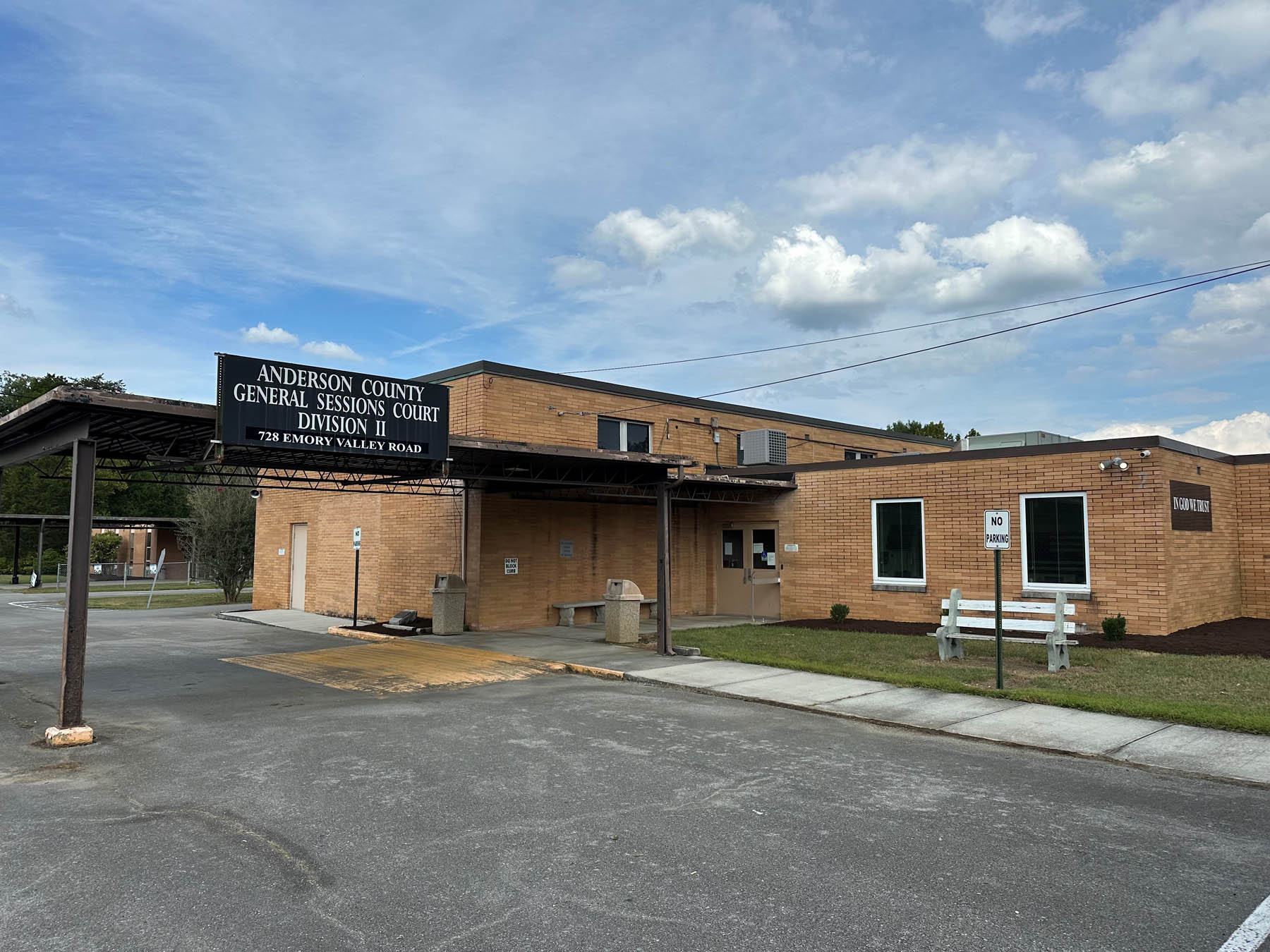Victim Services
Below is information and forms to help victims navigate the criminal justice system, including their constitutional rights, victim impact statement forms and injury compensation applications.
Documents
Resources & Helpful Information
CIC Resource Guide – PDF
Community Resources – PDF
Glossery Of Terms – PDF
Restitution Form – PDF
Steps in Prosecution of a Criminal Case – PDF
Suggestions for Witnesses – PDF
Victim Packet – PDF
Status Notifications
Surveys & Policies
Resources

Anderson County Family Justice Center (ACFJC)
info@fjcanderson.org
301 Broadway Avenue, Suite 100
Oak Ridge, Tennessee 37830
(865) 298-3129
• Free and confidential
• Helps victims of elder abuse, domestic violence, sexual assault and exploitation, and child
• Does not require an appointment
• Offers a safe space to talk with an advocate and/or counselor
• Offers safety planning
• Provides a location to talk with a police officer in a quiet and secure setting
• Assists in finding emergency shelter
• Provides a location to meet with a prosecutor
• Provides referrals to other agencies
• Assists in finding transportation
• Helps with Orders of Protections
• Helps with resume writing
• Provides victims with a safe space where they can begin to heal from their trauma
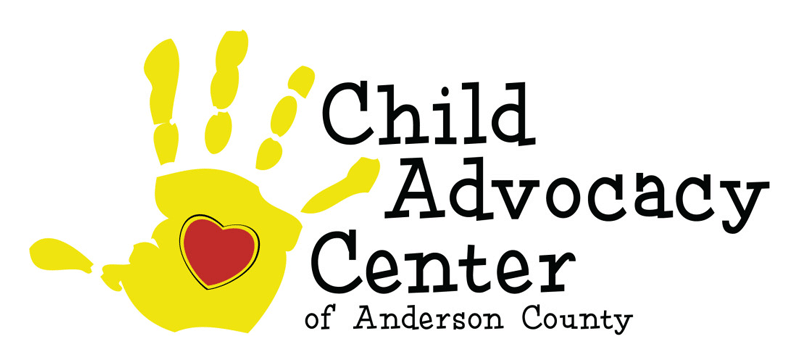
Child Advocacy Center (CAC)
cacactinc@comcast.net
752 N. Main Street
Clinton, Tennessee 37716
(865) 463-2740
The Child Advocacy Center of Anderson County, Tennessee, Inc., a tax exempt 501(c)3 non-profit charitable organization was established to meet this need. The Child Advocacy Center is governed by a volunteer board of community members, with priority given to those who have a passion for helping abused child(ren).
Services provided are:
• Child victims of physical and sexual abuse
• Child witnesses of violent crime
• Non offending family member and caregivers
• The community at large through education and prevention efforts

Criminal Injuries Compensation (CIC)
Criminal Injuries Compensation Fund was established as a fund of last resort to financially assist innocent victims of a violent crime in Tennessee that results in personal injury. In the case of death, dependent relatives may be eligible for compensation. Victims and claimants who meet eligibility requirements may be reimbursed for medical expenses, loss of wages, and other unforeseen costs related to the crime.
To fill out an application for compensation, go to the following website: https://live.origamirisk.com/Origami/IncidentEntry/Welcome

Sexual Assault Center of East Tennessee (SACET)
The Sexual Assault Center of East Tennessee (SACET) was founded in 1973 as the Knoxville Rape Crisis Center and remains one of two comprehensive community sexual assault agencies in the state of Tennessee; serving 16 counties. SACET provides victims of sexual assault with the support, information and resources needed throughout the recovery process. Advocates work to ensure that survivors’ legal rights are protected, while also empowering them. Clients of SACET receive support every step of the way from the time of crisis to their journey of healing.
Helpful Terms
Appeal
Convicted defendants have a right to appeal their convictions and sentences to higher courts. These courts examine the record made of the trial proceedings to determine if reversible error has occurred. If a higher court finds that serious errors occurred in the trial proceedings, it may remand the case for a new trial or even dismiss the charges. Although most appeals are unsuccessful, the process is often very lengthy. Appeals are handled by the State Attorney General’s Office.
Arraignment
The first scheduled appearance by the defendant in General Sessions or Criminal Court. If an indictment is returned by the grand jury, it is read and the defendant is given a copy. Arrangements are then made for an attorney for the defendant and a trial date may be set. Victim’s appearance is not necessary.
Bail
An amount paid or pledged by the defendant to make sure he or she will appear in court.
Grand Jury
An independent group of private citizens who listen to information about the crime in order to decide whether the case should go to trial. Victim’s appearance required.
Indictment
If the grand jurors decide that a case as met probable cause, they “return” an indictment charging the defendant with the crimes(s) committed.
Parole
The conditional release of a person from prison before the end of his or her sentence. If the person violates the conditions of his or her release, that person may be returned to prison. Involved parties may request to be notified by the Board of Parole of hearing dates and decisions prior to an individual’s release.
Other Release Status
Contact the Department of Correction to request notification on other releases i.e. escape, sentence expiration, work release.
Plea Agreement
An agreed disposition of a case. This is sometimes inaccurately referred to as “plea bargaining”. Most defendants plead guilty. A defendant may agree to plead guilty to the crime(s) charged or to a lesser offense. Once a defendant has agreed to plead guilty, it is the responsibility of the District Attorney’s Office and the defendant’s attorney to reach an agreement regarding the offenses and manner of service. This agreement is then presented to the judge who may accept or reject the plea or set the case for a sentencing hearing if there was no agreement as to the manner of service. Although a victim will not make the final decision as to what sentence is given, the District Attorney’s Office in interested in his or her view point.
Preliminary Hearing
A hearing, usually in General Sessions Court, to determine if there is probable cause to believe that a crime has been committed and that the defendant committed it. If the Judge determines that probable cause has been met, the case will be “bound over” to the grand jury. The victim’s appearance is required only if subpoenaed or requested. Even though you are not required to be present, you may come if you wish.
Sentencing Hearing
After a defendant’s guilty plea is accepted or he/she is found guilty after a trial, the judge hears evidence to determine the length and manner of sentence. The defendant may be sentenced to serve all or a portion of the sentence in jail or prison, or the sentence may be “suspended”, meaning the defendant is placed on probation so long as he or she is compliant with the terms of probation.
Trial
The court proceeding in which the District Attorney or an Assistant District Attorney presents the case for the State, attempting to prove beyond a reasonable doubt that the defendant committed the crimes(s) as charged. The defendant may present proof to dispute the State’s claim. Usually, the defendant chooses whether a judge or a twelve person person jury will decide the case. You should be present at the trial. If you are needed as a witness, you will be notified.
Victim’s Impact Statement
You will be given the opportunity to provide a written impact statement to be submitted by a probation officer as part of the pre-sentence report to be reviewed by the court prior to sentencing. If you wish to make an oral statement at the time of sentencing please contact the District Attorney’s Office prior to the hearing.
Warrant
A written order from a judge that a person be arrested. If you are a victim or a witness, the warrant is based on a written statement about the crime in which you were involved.
Victim’s Compensation
Tennessee law provides compensation for victims of violent crimes, or their dependents, who have suffered out-of-pocket losses due to physical injury, loss of income, or death. Contact the Victim Witness Coordinator in your District Attorney’s Office for additional information.
Coming to Court
Victim Services Staff

Amanda Owen
Domestic Violence Assistant Victim/Witness Coordinator
General Sessions Court and Criminal Court
akowen@tndagc.org

Kaitlyn Norris
Assistant Victim/Witness Coordinator
General Sessions Courts and Criminal Court
kanorris@tndagc.org

Katherine Sellers
Victim/Witness Coordinator
(Criminal Court)
kasellers@tndagc.org

Berto
Certified Facility Dog

Megan Teasley
Criminal Secretary
General Sessions Court Division I (Clinton)
mvwitzel@tndagc.org

Stephanie Mojica
Criminal Secretary
General Sessions Court Division II (Oak Ridge)
sjmojica@tndagc.org
